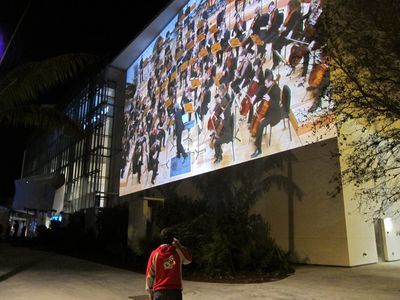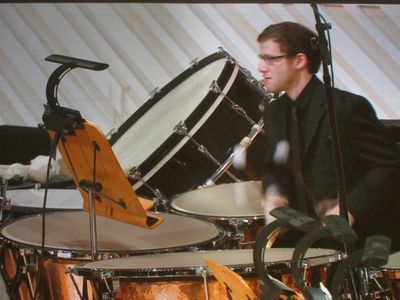Alex Ross's Blog, page 241
January 31, 2011
Portrait of a Serial Composer
At long last, Robert Hilferty's film Babbitt: Portrait of a Serial Composer, a documentary about the late Milton Babbitt, is out in the world. NPR is hosting the video; Laura Karpman did the work of completing it. Robert, a longtime friend of so many of us who wrote about music in New York, died tragically in 2009. He worked on his film for fifteen years; I saw the opening portion — in which Robert accosts people outside the old Lincoln Center Tower Records and asks them if they know Babbitt's music — back in 1999. (I remember more questions from the woman with asymmetrical sunglasses: "Is he signed? Is he a signed artist?") It's not perfect, but it's a heartfelt and deeply revealing piece of work. Babbitt got to see the finished version last fall, and sent Laura a three-word e-mail: "I love you."
January 29, 2011
New World WallCast
Last night, the New World Symphony inaugurated the "WallCast" feature of its new home, the New World Center. While the orchestra played inside the hall — the same program of Wagner, Adès, and Copland that it presented on Wednesday night — about a thousand people observed a simulcast in the Soundscape area outside. You can gauge the quality of the projected image by looking at the photos above: yes, the second one was taken from the middle of the lawn, not the middle of the orchestra. I also made a video of the first part of the Flying Dutchman Overture, which had intermittent canine accompaniment. Don't miss the overhead shot four minutes in.
For Milton Babbitt
I'm tremendously sad to hear that Milton Babbitt, the mathematical maverick of American music, passed away in Princeton this morning, at the age of ninety-four. There is much to be said about his place in twentieth-century musical history; I've written about such issues at length, and I'll have a comment in a coming issue of The New Yorker. But on the day of his death I'd like to remember him, above all, as a perfectly singular human being — a brilliant raconteur, a rapid-fire wit, a man who seemed to carry an entire century in his steel-trap mind. (Frank Oteri's 2001 interview at NewMusicBox gives a good indication of his talk.) Over the years I spent about three hours in his company, beginning when he visited my college radio station in 1988, and I savored every moment. I hope it doesn't seem too irreverent to commemorate his passing with The Bad Plus's version of Semi-Simple Variations (read about the background here), but I'm told that Babbitt did get to see the video, and professed to enjoy it. Goodbye, Milton! You will not be forgotten, and your music will thrive in unexpected ways.
January 26, 2011
Carlos Kleiber, New Yorker reader
Leo Carey, an editor at The New Yorker, has drawn my attention to the delightful fact that Carlos Kleiber, possibly the greatest conductor of the late twentieth century, was an avid reader of our magazine. A 2009 BBC 3 program about Kleiber, which has been transcribed at a Kleiber memorial website, has the following testimony from Peter Jonas:
He was phenomenally well read, I've never met anybody so well read. One of the most well thumbed books that he had at home, which he re-read constantly, was William Shawn's History of The New Yorker. [He probably means Brendan Gill's Here At The New Yorker. — ed.] In the early period of our friendship, you know, I would get my New Yorkers and post them to him after I'd read them, you know, and he would get them late by 'snail mail,' and all the rest. And I remember there was once in The New Yorker, many years ago, a fourteen-part serial on the aircraft industry, on the manufacture and sales of aero engines. [This would seem to be "A Sporty Game," a four-part John Newhouse series from 1982. — ed.] Now that's a totally useless subject. Who needs to know about all that, how aero engines are built and how they're sold, you know, separately from airplanes? And we used to correspond like mad about these kind of articles, and the longer the better, the more abstruse the better. He loved The New Yorker.
The entire program, hosted by Ivan Hewett, is full of revealing, amusing, and touching details. One learns that Kleiber had a major run-in with players of the Chicago Symphony; that Duke Ellington gave him the key to conducting the Coriolanus Overture; and that he accepted payment for one conducting gig in the form of an Audi worth £100,000.
New World Soundscape
Last night in Miami Beach, the New World Symphony inaugurated its new concert hall with a short program under the direction of Michael Tilson Thomas, its founder and artistic director. The architect is Frank Gehry. One notable feature of the complex is the Soundscape, an outdoor auditorium that allows passersby to see and hear performances from within the hall. A network of 164 speakers transfers the sound; live footage is projected on one wall of the building. The first simulcast will take place on Friday night, with a program of Wagner, Adès, and Copland. The amateur video above gives you a rough sense of what it's like to walk into the Soundscape from the street. The orchestra is rehearsing the Copland Third Symphony while technicians fine-tune the system outside.
Symphonie en blanc majeur (II)
January 23, 2011
Haas encore
My recent column on Georg Friedrich Haas is now online. The Argento Ensemble will perform in vain on Feb. 18, as part of the Tune-In Festival at the Armory.
January 22, 2011
Symphonie en blanc majeur
January 21, 2011
Midwinter revelations
The Seattle Symphony has announced its first season under the leadership of Ludovic Morlot, with world premieres by David Diamond, Michael Hersch, Nico Muhly, Daron Hagen, Cuong Vu, William Brittelle, and Vladimir Nikolaev. The featured composer is Henri Dutilleux, who, as it happens, turns ninety-five tomorrow. The Brooklyn Philharmonic, which has offered little in recent seasons, has made a bold move by hiring Alan Pierson, the leader of Alarm Will Sound, as its next artistic director. Pierson is a furiously inventive programmer, and I expect that Brooklyn is in for some lively musical adventures. Carnegie Hall has announced its 2011-12 season, which celebrates the 125th anniversary of the hall; of greatest interest is a New York extension of Michael Tilson Thomas's latest American Mavericks festival, the full version of which will unfold at the San Francisco Symphony in March 2012. Next week, MTT presides over the unveiling of a high-tech music complex for the New World Symphony, in Miami. The architect is Frank Gehry, designing his first concert hall since Disney. The inaugural concert will bring the world premiere of Thomas Adès's Polaris: Voyage for Orchestra. I will have a report in a future issue of the New Yorker. Finally, the estimable Philharmonia Baroque is marking its thirtieth anniversary by establishing an in-house label, which will kick off with a disc of Lorraine Hunt Lieberson singing Berlioz and Handel.
January 18, 2011
Film score report
 Oscar season is upon us, and I thought I'd mention two recent movie scores that I particularly liked. One is Hans Zimmer's music for Inception, with its colossal augmentation of Edith Piaf's "Non, je ne regrette rien"; I noted it last summer. Also praiseworthy is Trent Reznor and Atticus Ross's score for The Social Network, which does a stealthy job of dictating the mood of the film—its of-the-moment mixture of intellectual frenzy and emotional dread. When I first saw the movie, I felt a gnawing sense of unease, and only when I watched it again did I realize how economically Reznor and Ross instilled that feeling. During the title sequence, when the humiliated Zuckerberg character walks back to his dorm and sets about exacting online revenge, you hear a simple combination of musical events: a quiet, downward-loping piano figure and a faintly abrasive electronic buzz. It gives the impression of something seeping in from the ether, an ambient infection, which happens to take hold of the young man in the frame. The main-title music returns at crucial moments, notably when Zuckerberg, under interrogation by lawyers, witheringly answers the question "Do you think I deserve your full attention?" No less effective are the brutal, catatonic dance tracks that play at intervals and the disconcerting electronic manipulation of Grieg's "In the Hall of the Mountain King" that accompanies the Winkelvoss twins at the Henley Rowing Regatta. I wonder if David Fincher, the director, was thinking back to the creepy whistling in Fritz Lang's M when he asked Reznor to make use of that piece. In this context, the Grieg carries a grim message: the "old way of doing things" is itself degraded, a copy of a copy, and there is no going back.
Oscar season is upon us, and I thought I'd mention two recent movie scores that I particularly liked. One is Hans Zimmer's music for Inception, with its colossal augmentation of Edith Piaf's "Non, je ne regrette rien"; I noted it last summer. Also praiseworthy is Trent Reznor and Atticus Ross's score for The Social Network, which does a stealthy job of dictating the mood of the film—its of-the-moment mixture of intellectual frenzy and emotional dread. When I first saw the movie, I felt a gnawing sense of unease, and only when I watched it again did I realize how economically Reznor and Ross instilled that feeling. During the title sequence, when the humiliated Zuckerberg character walks back to his dorm and sets about exacting online revenge, you hear a simple combination of musical events: a quiet, downward-loping piano figure and a faintly abrasive electronic buzz. It gives the impression of something seeping in from the ether, an ambient infection, which happens to take hold of the young man in the frame. The main-title music returns at crucial moments, notably when Zuckerberg, under interrogation by lawyers, witheringly answers the question "Do you think I deserve your full attention?" No less effective are the brutal, catatonic dance tracks that play at intervals and the disconcerting electronic manipulation of Grieg's "In the Hall of the Mountain King" that accompanies the Winkelvoss twins at the Henley Rowing Regatta. I wonder if David Fincher, the director, was thinking back to the creepy whistling in Fritz Lang's M when he asked Reznor to make use of that piece. In this context, the Grieg carries a grim message: the "old way of doing things" is itself degraded, a copy of a copy, and there is no going back.
Alex Ross's Blog
- Alex Ross's profile
- 425 followers








